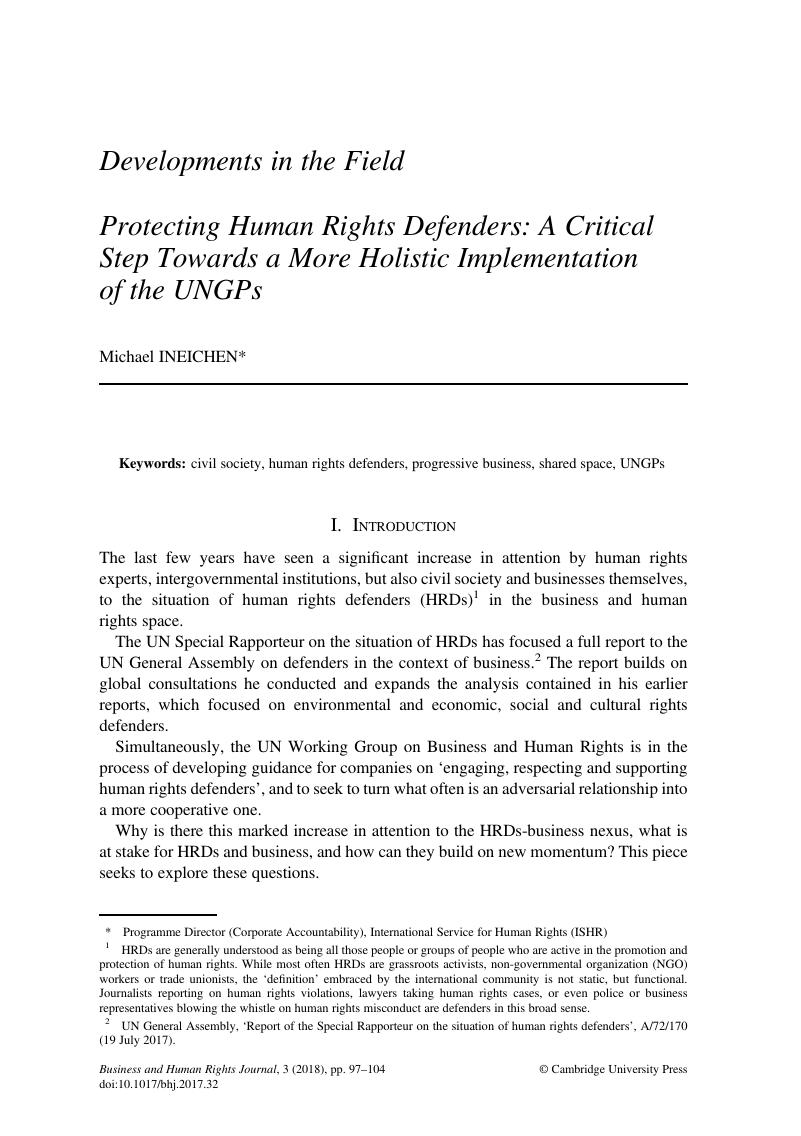Published online by Cambridge University Press: 08 January 2018

Programme Director (Corporate Accountability), International Service for Human Rights (ISHR)
1 HRDs are generally understood as being all those people or groups of people who are active in the promotion and protection of human rights. While most often HRDs are grassroots activists, non-governmental organization (NGO) workers or trade unionists, the ‘definition’ embraced by the international community is not static, but functional. Journalists reporting on human rights violations, lawyers taking human rights cases, or even police or business representatives blowing the whistle on human rights misconduct are defenders in this broad sense.
2 UN General Assembly, ‘Report of the Special Rapporteur on the situation of human rights defenders’, A/72/170 (19 July 2017).
3 See ISHR, ‘Strategic Framework 2017–2020’ (17 January 2017).
4 WEF, The Global Risks Report 2017, 12th edn (Geneva: WEF, 2017) 23–28.
5 See UN General Assembly, note 2, para 88.
6 See for instance the CIVICUS Monitor at https://monitor.civicus.org.
7 Harriet Sherwood, ‘Human Rights Groups Face Global Crackdown “Not Seen in a Generation”’, The Guardian (26 August 2015), http://bit.ly/2idUJYj (accessed 23 October 2017).
8 Alisa Tang, ‘Exclusive: Prominent UK Rights Activist, Fearing for Safety, Leaves Thailand’, Reuters (6 November 2016), http://reut.rs/2idUrkb (accessed 23 October 2017).
9 Office of the High Commissioner for Human Rights, ‘Mandatos del Grupo de Trabajo sobre la cuestión de los derechos humanos y las empresastransnacionales y otras empresas; del Relator Especial sobre la cuestión de las obligaciones de derechos humanos relacionadas con el disfrute de un medio ambiente sin riesgos, limpio, saludable y sostenible; del Relator Especial sobre la promoción y protección del derecho a la libertad de opinión y de expresión; del Relator Especial sobre la situación de los defensores de derechos humanos; y del Relator Especial sobre la independencia de los magistrados y abogados’, UA GTM 3/2017 (17 May 2017), http://bit.ly/2icWiG1.
10 UN General Assembly, note 2.
11 Ibid.
12 See Adidas HRDs policy at http://bit.ly/2icXxoF or the Coca-Cola Company’s first stand-alone human rights report at http://bit.ly/2iaUVYx (accessed 2 November 2017).
13 Carolijn Terwindt and Christian Schliemann, Supporting Civil Society Under Pressure – Lessons from Natural Resource Expoitation (E-paper: Heinrich Böll Foundation, 2017), https://www.ecchr.eu/en/documents/publications/articles/supporting-civil-society-under-pressure-2579.html (accessed 2 November 2017).
14 Inmaculada Barcia et al, ‘Women Human Rights Defenders Confronting Extractive Industries – An Overview of Critical Risks and Human Rights Obligations’ AWID (2017), https://www.awid.org/publications/women-human-rights-defenders-confronting-extractive-industries; Inmaculada Barcia et al, ‘Weaving Resistance Through Action: Strategies of Women Human Rights Defenders Confronting Extractive Industries’ AWID (2017), https://Www.Awid.Org/Resources/Weaving-Resistance-Through-Action-Strategies-Whrds-Confronting-Extractivism-And-Corporate (accessed 2 November 2017).
15 See: http://www.ishr.ch/sites/default/files/documents/10decupdated151115-joint-statement-hrds-bhr_with_logos_final.pdf (accessed 2 November 2017).
16 See: https://www.laborrights.org/releases/brands-must-speak-out-about-violations-cambodia (accessed 2 November 2017).
17 Such as in the case of IT companies selling surveillance software to authoritarian states to control demonstrations. See also CIVICUS, ‘State of Civil Society report 2017’, http://bit.ly/2ia2Kxt (accessed 2 November 2017) for a discussion of this.
18 ISHR, ‘Troublemakers and “Foreign Agents”: the Situation of Corporate Human Rights Defenders in Central Africa, Submission to the African Commission on Human and Peoples’ Rights Working Group on Extractive Industries, Environment and Human Rights Violations’ (July 2015), http://bit.ly/2icJmjm (accessed 2 November 2017).
19 Philip Alston, ‘Human Rights Under Siege’ (2017) 14:25 SUR 267–272, http://sur.conectas.org/en/human-rights-siege/ (accessed 2 November 2017).
20 CIVICUS, note 17.
21 The Corporate Human Rights Benchmark includes a specific indicator on the existence of a commitment to respect HRDs.
22 UN General Assembly, note 2, para 61.
23 Such as the policy commitment by Adidas, note 12.
24 Such as in the FIFA human rights policy, in which it commits to ‘respect and not interfere with the work of both human rights defenders who voice concerns about adverse human rights impacts relating to FIFA and media representatives covering FIFA’s events and activities. Where the freedoms of human rights defenders and media representatives are at risk, FIFA will take adequate measures for their protection including by using its leverage with the relevant authorities’. FIFA, ‘FIFA’s Human Rights Policy’ (May 2017), http://bit.ly/2iccw2m (accessed 2 November 2017).
25 See the recent Oxfam report on pathways to deforestation-free food: Aditi Sen, ‘Pathways to Deforestation-Free Food’, Oxfam Briefing Paper (September 2017), https://www.oxfam.org/en/research/pathways-deforestation-free-food (accessed 2 November 2017).
26 FTA, ‘Increased Partnership in Sustainability – Call for Out of Court Settlement of the Thammakaset Case, Letter to the Ambassador of Thailand to the Kingdom of Belgium, Luxemburg and the European Union Mission of Thailand to the European Union’ (11 July 2017), http://www.fta-intl.org/sites/default/files/letter%20to%20Thai%20Embassy%20July%202017.pdf (accessed 2 November 2017).
27 See: https://www.ishr.ch/news/unga72-corporate-responsibility-respect-human-rights-requires-supporting-human-rights-defenders (accessed 2 November 2017).
28 At the time of writing, a first draft of the guidance is under discussion by the UN Working Group on Business and Human Rights. See http://www.ohchr.org/EN/Issues/Business/Pages/HRDefendersCivicSpace.aspx (accessed 12 December 2017) for details about the process.
29 As expressed by their support to UN processes, or through their diplomatic efforts of protecting HRDs.
30 However, to date, very few National Action Plans (NAPs) even mention HRDs, and according to the latest analysis by the International Corporate Accountability Roundtable (ICAR) and others ‘it does not appear that the assessed NAPs included processes to facilitate participation in these consultations by disempowered or at-risk stakeholders’ in the host countries of globally operating companies. This is particularly regrettable given the existence of guidelines on the protection of HRDs in many of the concerned European states (Finland, Sweden, Switzerland and Italy) and a HRDs protection mechanism in the one non-European state (Colombia). See: https://www.icar.ngo/news/2017/8/20/icar-eccj-and-dejusticia-release-2017-update-of-national-action-plan-assessments (accessed 2 November 2017).